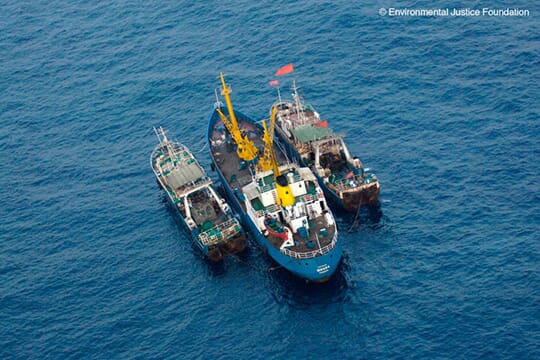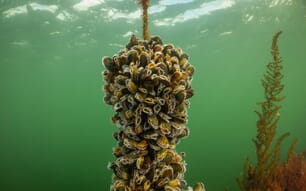Global losses due to Illegal, Unreported and Unregulated (IUU) or ‘pirate’ fishing are estimated to be between US $10 billion and US $23.5 billion every year. West African waters are deemed to have the highest levels of IUU fishing in the world, representing up to 37 per cent of the region’s catch. Along with the economic losses, pirate fishing in West Africa severely compromises food security and the livelihoods of coastal communities, the health of fish stocks and the marine environment.
Through its work towards the eradication of IUU fishing in West Africa, EJF has gathered evidence that the transhipment of fish from one vessel to another frequently facilitates the laundering of ‘pirate’ fish, due to the inability of coastal and flag State authorities to monitor how, by whom and where transferred fish was caught.
Furthermore, ineffective monitoring means that consignments of transhipped fish regularly enter the EU marketplace. The opportunity for fish ‘laundering’ to take place without detection means that fish stolen by pirate fishers from some of the poorest coastal communities in the world is being authorised by the EU to enter the European marketplace and end up on our plates. Meanwhile 70 per cent of the population of Sierra Leone, where EJF carries out investigations, live below the national poverty line and 46 per cent are undernourished (Source: UNDP United Nations Development Programme).
Case Study: Sierra Loba
In 2012, several Korean-flagged vessels were authorised by coastal States to tranship fish at sea onto the Curacao-flagged reefer Sierra Loba. Among them was the Poong Lim 12, which EJF had previously documented fishing illegally. The Sierra Loba also transhipped in Guinea with the Five Star and Kummyeong 2, both of which are considered to be ‘fugitive’ IUU vessels.
Case Study: Seta 73
In 2011, EJF documented the illegal transhipment of fish from the Seta 73 with the Seta 70, Marcia 707, 515 Amapola and Medra. All four vessels had been documented by EJF fishing illegally in the waters of Sierra Leone two months prior to the transhipment. Consequent investigations by the EU revealed numerous IUU transhipments undertaken by the Seta 73 in other West African countries including Liberia, Guinea and Guinea Bissau.
Key findings of the briefing include:
- Whether they are authorised or not, transhipments at sea frequently facilitate the laundering of IUU fish due to the inability of coastal and flag State authorities to monitor transhipments.
- EJF documented that crews on board vessels that tranship at sea are often victims of human rights abuses and labour violations as they stay at sea for long periods and rarely go to port.
- Transhipments at sea are common practice. Many fishing operators favour them as a quick way of avoiding bureaucratic port controls and maximising their profits.
- Developing coastal countries do not have the logistical capacity to inspect the vessels at sea before the transhipments take place in order to ensure that the fish has been caught legally.
- Illegal transhipments at sea take place in areas that coastal patrols cannot reach or in areas disputed by coastal countries, such as the maritime boundary between Guinea and Sierra Leone (as was the case with the Canarian Reefer, which EJF documented transhipping in January 2012).
Steve Trent, Executive Director of EJF, commented: “The complications involved in monitoring large-scale transfers of fish at sea, mean that any transhipment of fish from one vessel to another can currently obscure illegal activities. Transhipment adds to the opacity in global fisheries that enables pirate fishers to operate in the shadows, far from supervision and regulation. Fish is being caught illegally in the waters of West Africa, transhipped at sea and ‘laundered’ under a legal vessel’s paperwork to end up on our plates in Europe. Pirate fishing is devastating coastal communities in West Africa, where they have the highest levels of illegal fishing in the world. We simply cannot allow their food security to continue to be compromised whilst their fish enters the European marketplace. EJF is calling for urgent action to address the issue and ban transhipment at sea, which is hindering the transparency required for global fisheries to be managed effectively and fairly.”
The new briefing provides recommendations for urgent action. Coastal States must ban transhipment at sea and work with neighbouring countries and international partners to control their Exclusive Economic Zones (EEZ). Flag States of fishing vessels and reefers need to restrict them from carrying out transhipments at sea in the waters of West Africa, FAO 34. The EU should close access to the European market for fish that was transhipped at sea without effective monitoring.
EJF is committed to bringing an end to IUU or ‘pirate’ fishing which continues to destroy marine environments and blight the lives of coastal communities in West Africa. There is an urgent need for Governments, international organisations and the seafood industry to insist on transparency in global fisheries management.





